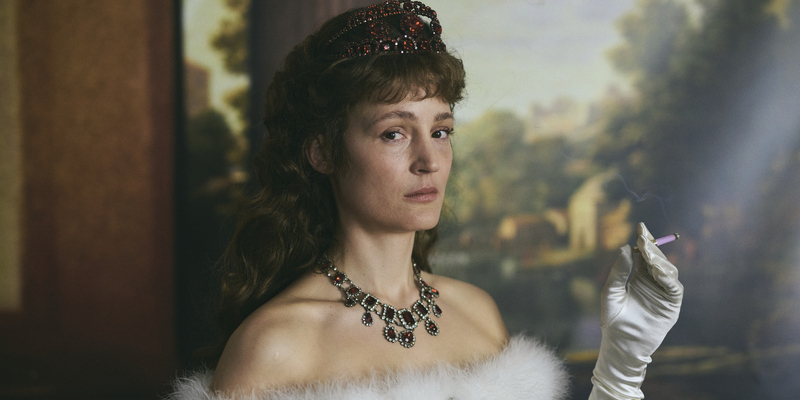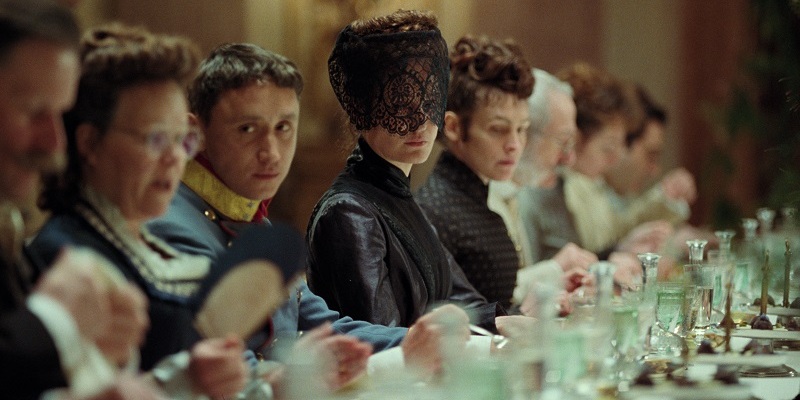
Review by
Benjamin Poole
Directed by: Marie Kreutzer
Starring: Vicky Krieps, Florian Teichtmeister, Katharina Lorenz, Jeanne Werner,
Colin Morgan

Funny watching this on the weekend that the Duke and Duchess of Sussex’s
documentary dropped on Netflix. One product features a princess who every
gobshite seems to have a point of view about; judging her figure, her
approach to life and the management of her office with a scrutiny that her
husband simply isn’t subjected to.... while the other etc, etc. Opening
the Daily Mail website on Friday (I know, I know: the things I do for
research. Hold your nose, innit) with its extensive negative coverage of
the doc, one might imagine that Meghan née Markle had committed a
widespread terrorist atrocity, and not just adopted the sort of glib
vacuity which seems to define modern celebrity (at least she hasn’t
appropriated Nazi iconography, ala Ye or her literal own husband, eh
lads?).

You wonder what it is about the beautiful, mixed race, American, raised by
a single parent Meghan that gets Middle England so riled. Beats me. Via
archetypal narratives and patriarchal conditioning, the aspirational ideal
of ‘the princess’ is a standard inculcated at birth. And so perhaps the
wholesale anger towards Meghan (yes, she’s mononymical like Madonna, or
Bungle) is simple jealousy: why her, and not me? But then that wouldn’t
explain the global acceptance of white, British, middle-class Kate
Windsor... Christ knows. Maybe I’m not the best person to ask, seeing as I
ordinarily have a complete lack of interest in the royals. Mind you, that
hasn’t prevented everyone else from chipping in...
Because in a sense, I suppose, we do own these people, and pay for their
privilege. Isn’t chatting shit about them part of the deal? I’ll give it
to Meghan - she provides her money’s worth. It’s a different story for
Empress Elisabeth of Austria in Marie Kreutzer’s
Corsage, which is a fictional account of one year (1878) in the life of the
sovereign. Played by the amazing Vicky Krieps, Elisabeth has just
turned 40 and is subject to the vicissitudes not only of age, but, shock,
also a public who cannot grasp the dynamics of time and how it affects
women entering their autumn years.

Picking up with Elisabeth at a beleaguered point in her life, Kreutzer’s
film opens with a collocation of constructed falsities: we see Elisabeth
fake a faint to get out of public duties, while behind closed doors her
feckless husband Emperor Franz Joseph (Florian Teichtmeister) peels
off some false mutton chops. Corsage constructs a
recognisably contemporary world of image and public persona, an approach
reinforced by the film’s diegetic score of stuff like a lute-played As
Tears Go By, and visual anachronisms such as a relocation of cinema’s
invention and the use of intravenous drugs (!). Such confections present
Corsage as a parable, a fitting approach to any royal
figure, whose reception depends as much upon myth making and public
impression as it does hard biography.
In the ensuing character study, we see Sissi at once attempt to forge an
independence, but also kotow to the public expectations of her: starving
herself, exercising, forcing her body into the titular figure crushing
regalia. Along the way, she has an affair with her riding coach, and faces
the approbation of not only her husband and the court, but her own
adolescent son who remonstrates that she "abandons herself to every whim
without considering your position." By position, he means the public
impression of her, of course. It’s a lot to ask, to be constantly ‘on’ all
the time, in a role as joyless as it thankless (at least Meghan seems to
be living her absolute best life, despite the haterz). In one of the
film's conspicuous parallels with Diana Spencer, Sissi visits wounded
soldiers and lies down in a hospital bed to share cigarettes with one; in
another she stalks the other woman who Franz is knocking off while
furtively pursuing her own affair with a sexy foreigner. Subtle
Corsage ain’t: visiting an asylum for fallen women, one poor
lady is bunched into a restrictive cage for her own good. The camera
pointedly lingers...

As when the final shots conform to the accepted feminist narrative of last
resort empowerment (think Ophelia and Virginia Woolf’s final moments),
Kreutzer deals within transferable forms and universal tropes to make a
wider point about the perception of women. Likewise, the mise-en-scene of
warm mahogany shades, and colourful costumes of powder blue/unblemished
cream is a familiar pleasure, along with that wide angle shot you get in
costume dramas where there is a long table, and each character sits at the
opposite end to express their estrangement. Krieps is, of course, magnetic
and imbues the occasional on-the-nose stylings of
Corsage with depth and feeling, sometimes characterising the
entire tone of a scene with a twist of her lip or a directed glance,
transcending her Elisabeth beyond mere archetype and the limited
perceptions of her public. Let’s hope someone equally as talented plays
Meghan in Corsage’s 2150 equivalent.

Corsage is on MUBI UK now.
